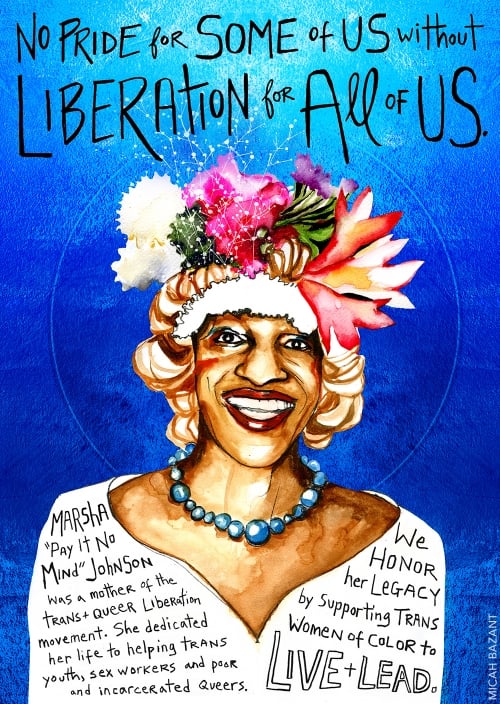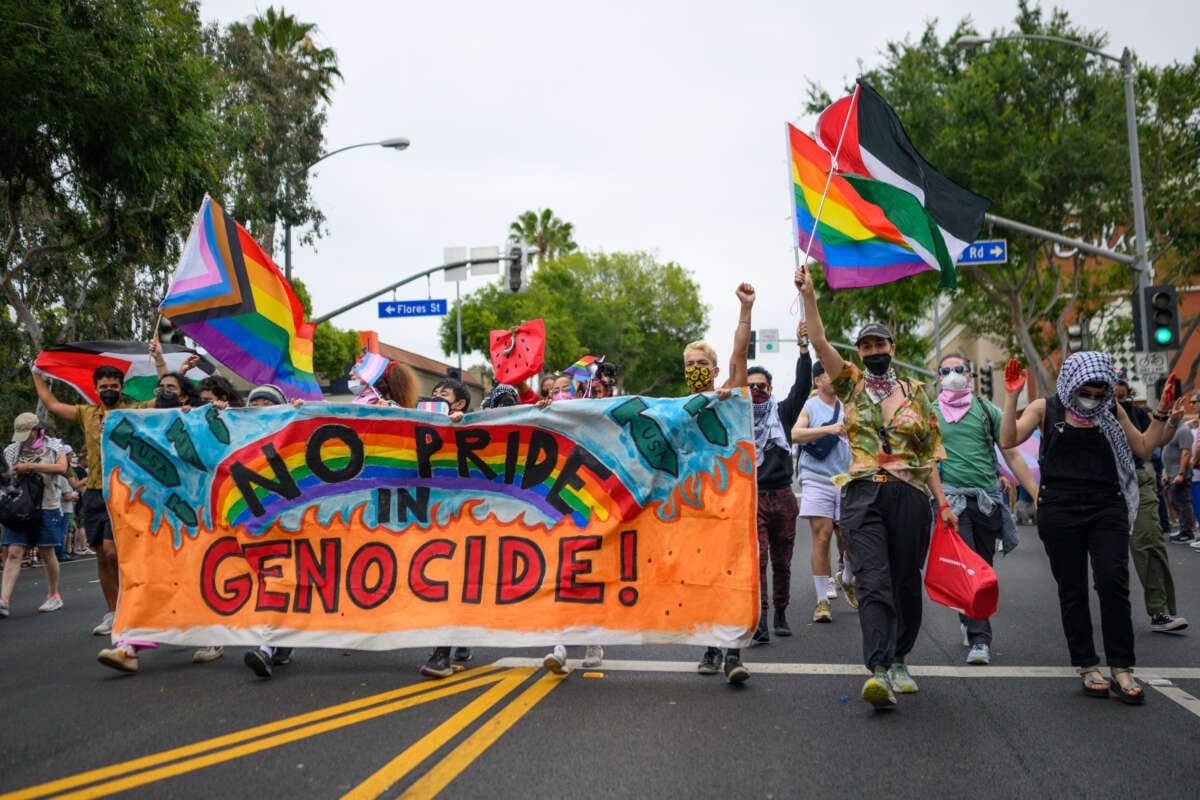Part of the Series
Struggle and Solidarity: Writing Toward Palestinian Liberation
Truthout is an indispensable resource for activists, movement leaders and workers everywhere. Please make this work possible with a quick donation.
Every June, as rainbow boas and blue and pink banners unfurl, and jello shots and plastic cups of light beer tumble onto the streets, borne by tens of thousands of happy gays, a cultural battle ensues. Pride season is here, and everyone is pissed.
On one side of the battle, you have the corporate gays, the nonprofit-industrial complex of LGBTQ organizations, the glitzy and boozy Pride parades and parties, and the representation of gay and trans identity as a fully assimilated, capitalism-compatible lifestyle.
On the other, you have all of us who recognize that Pride emerged from a legacy of anti-police uprising, militant queer solidarity, and a fiercely political stance on what it means to live as transgender, gay, lesbian, bisexual, queer, intersex, nonbinary, or otherwise defiant of gender and sexuality norms. This is the original tradition of Pride — a radical protest for self-determination in opposition to mainstream values, a protest that has often angered and horrified “straight” society.
This year’s Pride battle is marked by a particularly bloody line in the sand: the eight month and running genocidal attack on the Gaza Strip, perpetrated by the Israeli government, which frequently uses a tactic known as “pinkwashing” to push forward its global propaganda campaign. According to the educational website Decolonize Palestine, “Pinkwashing refers to when a state or organization appeals to LGBTQ+ rights in order to deflect attention from its harmful practices.”
Recognizing that queer people exist everywhere on earth, including Gaza, LGBTQ Palestinians and their allies have been calling on queer organizations to support a ceasefire, oppose apartheid and take firm stances against the genocide and occupation of Palestine by a powerful U.S.-funded military. Since October 7, 2023, Israel has killed over 37,000 Palestinians in Gaza, injured more than 85,000, and destroyed most of the Gaza Strip’s key institutions including universities and hospitals.
Meanwhile, advocates for Israel and the United States’ violence and impunity have used the identities of queer Palestinians and Israelis as a bludgeon and a distraction. Practitioners of pinkwashing assert that Israel, and the Western governments who support its military occupation, represent a morally superior stance on LGBTQ issues. When it is convenient, Israel advertises itself as a gay haven, and pro-Israeli propaganda frequently deploys claims that Palestine, and Gaza specifically, are unsafe for queer people — the implication being that these “backward” places will ultimately be improved by capitalist settler colonialism. Cultural imperialists and neoliberals have thrown this same mythology like a blanket thrown over all Arab and Muslim countries and cultures, making invisible the existence of queer and trans Arabs and Muslims.
“There has always been a certain amount of pain around Pride for me,” says Maya Ghanem, an organizer based in Durham, North Carolina, who works with the Muslim women’s and queer group Jummah 4 All. She says she’s never fully identified with U.S. Pride. “There has been pain around this even before October 7 because my whole life I was told that as a Muslim and as an Arab — I’m Syrian Lebanese — that I can’t be queer or trans. I was told that by my own community and by rainbow capitalism as well. Every time pride came along, I felt this bitterness because I know that those are histories of colonization.”
Even as imperialist countries like the U.S., the U.K. and Israel claim they are globalizing gay rights and exporting pro-queer ideology, the reality is nearly the opposite. The first anti-gay law on the books in Gaza, for example, was passed in 1936 as a direct result of the British occupation of Palestine and the British Mandate. More recently, U.S. Christian fundamentalist organizations have poured millions of dollars into anti-gay campaigns in Uganda and other African countries. And according to the BBC, two-thirds of the 69 countries where it is illegal to be gay were once under British rule, which explicitly criminalized homosexuality, in many cases for the first time in those countries’ history.
“The Western imperialists claim that they are progressive, and they protect queer people, and they are the ones who globalized homophobia in the first place,” says Benny Koval of the Raleigh Wake Workers Assembly and Meals for the Masses. “That’s the chutzpah of it all.”
“It is very refreshing to see queer people come out and say no, you cannot weaponize my identity to enable a genocide,”
This year, in part due to growing global support for Palestinians, an analysis of pinkwashing is on more people’s tongues than ever before. Ghanem and Koval both organize in Raleigh, North Carolina, where Out! Raleigh Pride, the city’s major pride event, agreed to join the Boycott, Divestment, Sanctions (BDS) movement for the first time this year. This week the organizers of Out! Raleigh Pride confirmed via email that they will give back funds the organization received from pro-Israel entities in order to become BDS compliant. That may make Raleigh the first major mainstream pride event in the U.S. to formally join the BDS movement.
Ghanem, who was among those who privately pushed Raleigh’s festival to join the BDS movement, says the connections for her are clear.
“It is very refreshing to see queer people come out and say no, you cannot weaponize my identity to enable a genocide,” she says. As a queer Muslim, “often we are told by these systems of colonialism and imperialism that our identity is inherently a contradiction. But we are here to say, no, that is not the case, and that our experiences and perspectives must be centered in the conversation. Any liberation movement for Palestine has to put those intersectional identities at the forefront.”
Jummah 4 All joined with Triangle JVP, the Young Democratic Socialists of America at North Carolina State University, Students for Justice in Palestine at University of North Carolina Chapel Hill, the Raleigh Wake Workers Assembly, Meals for the Masses, and Community Justice, Abolition and Antiracism in an effort to pressure Out! Raleigh Pride to take a stance on Palestine.
Initially, says Koval, LGBTQ activists asked the organization to speak out about a ceasefire in Gaza and received no response.
“The sustained pressure of this movement and long-term organizing had a big impact,” says Koval. “BDS is one of the most important ways that we can support Palestine, especially in the belly of the beast.”

While Raleigh may be one of the only mainstream U.S. prides to agree to BDS, the city joins a broad international tradition of queer solidarity with Palestine. In November 2023, a collective of queer Palestinians and allies issued a statement titled “A Liberatory Demand from Queers in Palestine” that was co-signed and amplified by 523 organizations. Signatories include PRIOT, a liberationist pride event in Rome, Italy; Black Pride Netherlands; Reclaim Pride in Bergen, Norway; Iloilo Pride Team in the Philippines; Pride of Arabia in the U.K.; Trans and Intersex Pride of Dublin, Ireland; Nørrebro Pride in Denmark; the Ottawa Dyke March in Canada; and hundreds of other LGBTQ organizations and collectives on every continent.
In the U.S., the Dyke March (a trans-inclusive dyke centered Pride event) has always maintained an explicitly political identity and defied the corporatization and whitewashing of Pride. Over the years, Dyke March organizers in San Francisco, Chicago and D.C. have declared their support for Palestinians and their alignment with other anti-imperialist causes. This summer’s New York City Dyke March, to take place on June 29, is under the theme “Dykes Against Genocide.” The march aims to draw attention to the ongoing genocides and human rights violations in Palestine, the Democratic Republic of the Congo, Ethiopia, Haiti, Myanmar, Sudan and Ukraine.
Again, this is part of a tradition, the original tradition of Pride and queer activism. In January of this year, the historic queer organization ACT UP announced its enthusiastic support for the BDS movement.
“Our history motivates us as we choose to stand with Palestinians against a settler-colonial state backed by the finances and brutality of the United States,” ACT UP leaders wrote in a statement. This year some pro-Palestine activists in the U.S. have recycled powerful imagery from ACT UP’s militant demonstrations in the 1980s and 1990s — a pink triangle with the statement “Silence=Death,” which originally referred to silence about the AIDS crisis, has reappeared as a pink slice of watermelon, using the same slogan to make a concise point about the deep harm of silence about Palestine. Thousands of lives are indeed on the line.
And yet, larger U.S. Pride parades and events continue to receive funds from Zionist organizations and refuse demands to participate in the BDS movement. They claim they cannot afford to lose funding, or that they don’t want to alienate Jewish constituents, in spite of the fact that many calling for BDS are queer Jews. Or they simply, and ironically, stay silent.
Their refusal has led to protests this year at Boston, D.C., Queens and Philadelphia Prides; many groups and individual artists have also boycotted Pride events entirely. San Francisco Pride called for a ceasefire in February of 2024, but has not agreed to BDS. In lieu of that, pro-Palestine groups in San Francisco are offering dozens of alternative events ranging from drag and comedy to panels and parades, and even offering to donate funds directly to artists and performers who agree to boycott Pride when they will lose money for doing so.
In January of this year, the historic queer organization ACT UP announced its enthusiastic support for the BDS movement.
The stance against genocide should be a no-brainer for Pride. Our traditions are strong. But the deeper issue is the battle over the political meaning of being queer in the context of global capitalism and imperialism. Is gay or trans pride an effort to assimilate, marry, join the military, and protect wealth and private property, while simultaneously devaluing queer lives when they are Black, Brown, Muslim, or poor? Or is pride a portal to self-determination and liberation in solidarity with all oppressed people, which inherently means rejecting militarism, police and the values of any mainstream society that continues to restrict bodily autonomy for some?
“It doesn’t have to be this way — there’s so much beauty and potential” in Pride, says Ghanem. “But when you see Pride as a capitalistic extravaganza, all of that potential for me feels lost.”
I’m here for everyone who is keeping alive the true tradition of Pride — the queer protesters and activists who recognize that we wouldn’t be walking these streets without the revolutionary fervor of those who came before. As the artist Micah Bazant so concisely wrote on their poster honoring trans activist Marsha P. Johnson, “No pride for some of us without liberation for all of us.”
A terrifying moment. We appeal for your support.
In the last weeks, we have witnessed an authoritarian assault on communities in Minnesota and across the nation.
The need for truthful, grassroots reporting is urgent at this cataclysmic historical moment. Yet, Trump-aligned billionaires and other allies have taken over many legacy media outlets — the culmination of a decades-long campaign to place control of the narrative into the hands of the political right.
We refuse to let Trump’s blatant propaganda machine go unchecked. Untethered to corporate ownership or advertisers, Truthout remains fearless in our reporting and our determination to use journalism as a tool for justice.
But we need your help just to fund our basic expenses. Over 80 percent of Truthout’s funding comes from small individual donations from our community of readers, and over a third of our total budget is supported by recurring monthly donors.
Truthout’s fundraiser ended last night, and we fell just short of our goal. But your support still matters immensely. Whether you can make a small monthly donation or a larger one-time gift, Truthout only works with your help.
